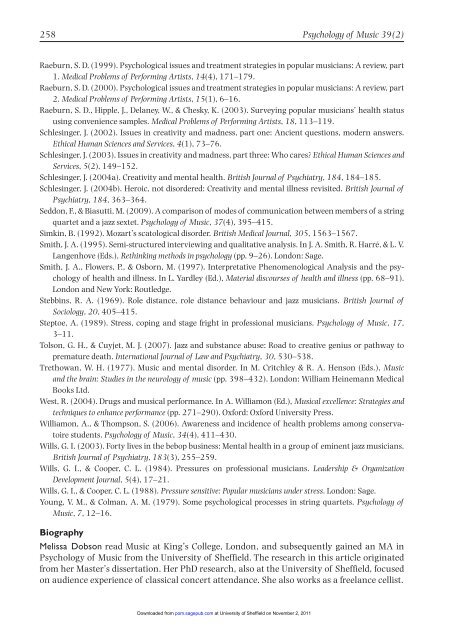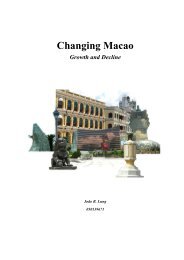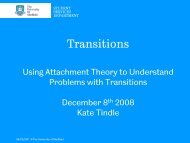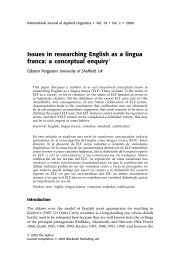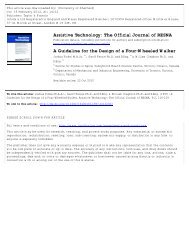Dobson, 2010.pdf - University of Sheffield
Dobson, 2010.pdf - University of Sheffield
Dobson, 2010.pdf - University of Sheffield
Create successful ePaper yourself
Turn your PDF publications into a flip-book with our unique Google optimized e-Paper software.
258 Psychology <strong>of</strong> Music 39(2)<br />
Raeburn, S. D. (1999). Psychological issues and treatment strategies in popular musicians: A review, part<br />
1. Medical Problems <strong>of</strong> Performing Artists, 14(4), 171–179.<br />
Raeburn, S. D. (2000). Psychological issues and treatment strategies in popular musicians: A review, part<br />
2. Medical Problems <strong>of</strong> Performing Artists, 15(1), 6–16.<br />
Raeburn, S. D., Hipple, J., Delaney, W., & Chesky, K. (2003). Surveying popular musicians’ health status<br />
using convenience samples. Medical Problems <strong>of</strong> Performing Artists, 18, 113–119.<br />
Schlesinger, J. (2002). Issues in creativity and madness, part one: Ancient questions, modern answers.<br />
Ethical Human Sciences and Services, 4(1), 73–76.<br />
Schlesinger, J. (2003). Issues in creativity and madness, part three: Who cares? Ethical Human Sciences and<br />
Services, 5(2), 149–152.<br />
Schlesinger, J. (2004a). Creativity and mental health. British Journal <strong>of</strong> Psychiatry, 184, 184–185.<br />
Schlesinger, J. (2004b). Heroic, not disordered: Creativity and mental illness revisited. British Journal <strong>of</strong><br />
Psychiatry, 184, 363–364.<br />
Seddon, F., & Biasutti, M. (2009). A comparison <strong>of</strong> modes <strong>of</strong> communication between members <strong>of</strong> a string<br />
quartet and a jazz sextet. Psychology <strong>of</strong> Music, 37(4), 395–415.<br />
Simkin, B. (1992). Mozart’s scatological disorder. British Medical Journal, 305, 1563–1567.<br />
Smith, J. A. (1995). Semi-structured interviewing and qualitative analysis. In J. A. Smith, R. Harré, & L. V.<br />
Langenhove (Eds.), Rethinking methods in psychology (pp. 9–26). London: Sage.<br />
Smith, J. A., Flowers, P., & Osborn, M. (1997). Interpretative Phenomenological Analysis and the psychology<br />
<strong>of</strong> health and illness. In L. Yardley (Ed.), Material discourses <strong>of</strong> health and illness (pp. 68–91).<br />
London and New York: Routledge.<br />
Stebbins, R. A. (1969). Role distance, role distance behaviour and jazz musicians. British Journal <strong>of</strong><br />
Sociology, 20, 405–415.<br />
Steptoe, A. (1989). Stress, coping and stage fright in pr<strong>of</strong>essional musicians. Psychology <strong>of</strong> Music, 17,<br />
3–11.<br />
Tolson, G. H., & Cuyjet, M. J. (2007). Jazz and substance abuse: Road to creative genius or pathway to<br />
premature death. International Journal <strong>of</strong> Law and Psychiatry, 30, 530–538.<br />
Trethowan, W. H. (1977). Music and mental disorder. In M. Critchley & R. A. Henson (Eds.), Music<br />
and the brain: Studies in the neurology <strong>of</strong> music (pp. 398–432). London: William Heinemann Medical<br />
Books Ltd.<br />
West, R. (2004). Drugs and musical performance. In A. Williamon (Ed.), Musical excellence: Strategies and<br />
techniques to enhance performance (pp. 271–290). Oxford: Oxford <strong>University</strong> Press.<br />
Williamon, A., & Thompson, S. (2006). Awareness and incidence <strong>of</strong> health problems among conservatoire<br />
students. Psychology <strong>of</strong> Music, 34(4), 411–430.<br />
Wills, G. I. (2003). Forty lives in the bebop business: Mental health in a group <strong>of</strong> eminent jazz musicians.<br />
British Journal <strong>of</strong> Psychiatry, 183(3), 255–259.<br />
Wills, G. I., & Cooper, C. L. (1984). Pressures on pr<strong>of</strong>essional musicians. Leadership & Organization<br />
Development Journal, 5(4), 17–21.<br />
Wills, G. I., & Cooper, C. L. (1988). Pressure sensitive: Popular musicians under stress. London: Sage.<br />
Young, V. M., & Colman, A. M. (1979). Some psychological processes in string quartets. Psychology <strong>of</strong><br />
Music, 7, 12–16.<br />
Biography<br />
Melissa <strong>Dobson</strong> read Music at King’s College, London, and subsequently gained an MA in<br />
Psychology <strong>of</strong> Music from the <strong>University</strong> <strong>of</strong> <strong>Sheffield</strong>. The research in this article originated<br />
from her Master’s dissertation. Her PhD research, also at the <strong>University</strong> <strong>of</strong> <strong>Sheffield</strong>, focused<br />
on audience experience <strong>of</strong> classical concert attendance. She also works as a freelance cellist.<br />
Downloaded from<br />
pom.sagepub.com at <strong>University</strong> <strong>of</strong> <strong>Sheffield</strong> on November 2, 2011


